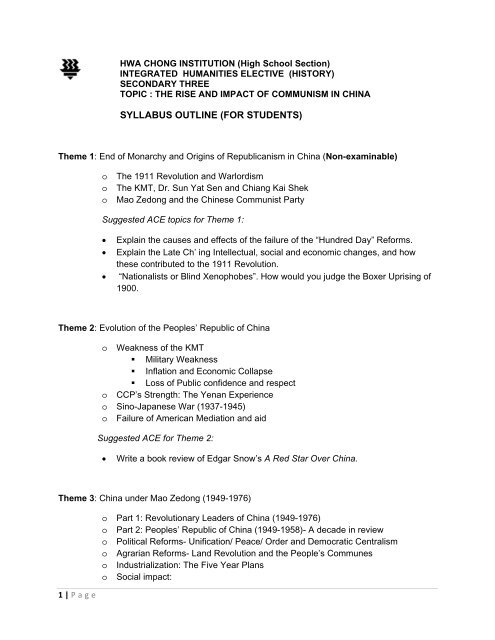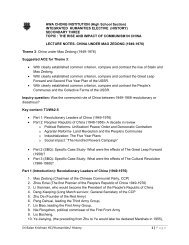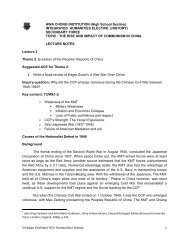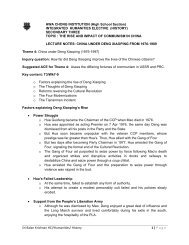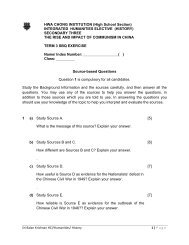SYLLABUS OUTLINE (FOR STUDENTS) - Hwa Chong Institution
SYLLABUS OUTLINE (FOR STUDENTS) - Hwa Chong Institution
SYLLABUS OUTLINE (FOR STUDENTS) - Hwa Chong Institution
You also want an ePaper? Increase the reach of your titles
YUMPU automatically turns print PDFs into web optimized ePapers that Google loves.
HWA CHONG INSTITUTION (High School Section)<br />
INTEGRATED HUMANITIES ELECTIVE (HISTORY)<br />
SECONDARY THREE<br />
TOPIC : THE RISE AND IMPACT OF COMMUNISM IN CHINA<br />
<strong>SYLLABUS</strong> <strong>OUTLINE</strong> (<strong>FOR</strong> <strong>STUDENTS</strong>)<br />
Theme 1: End of Monarchy and Origins of Republicanism in China (Non-examinable)<br />
o<br />
o<br />
o<br />
The 1911 Revolution and Warlordism<br />
The KMT, Dr. Sun Yat Sen and Chiang Kai Shek<br />
Mao Zedong and the Chinese Communist Party<br />
Suggested ACE topics for Theme 1:<br />
• Explain the causes and effects of the failure of the “Hundred Day” Reforms.<br />
• Explain the Late Ch’ ing Intellectual, social and economic changes, and how<br />
these contributed to the 1911 Revolution.<br />
• “Nationalists or Blind Xenophobes”. How would you judge the Boxer Uprising of<br />
1900.<br />
Theme 2: Evolution of the Peoples’ Republic of China<br />
o Weakness of the KMT<br />
• Military Weakness<br />
• Inflation and Economic Collapse<br />
• Loss of Public confidence and respect<br />
o CCP’s Strength: The Yenan Experience<br />
o Sino-Japanese War (1937-1945)<br />
o Failure of American Mediation and aid<br />
Suggested ACE for Theme 2:<br />
• Write a book review of Edgar Snow’s A Red Star Over China.<br />
Theme 3: China under Mao Zedong (1949-1976)<br />
o Part 1: Revolutionary Leaders of China (1949-1976)<br />
o Part 2: Peoples’ Republic of China (1949-1958)- A decade in review<br />
o Political Reforms- Unification/ Peace/ Order and Democratic Centralism<br />
o Agrarian Reforms- Land Revolution and the People’s Communes<br />
o Industrialization: The Five Year Plans<br />
o Social impact:<br />
1 | Page
o<br />
• “The Hundred Flowers Campaign”<br />
• Mass Movements (e.g. Red Guards) and Psychological Control<br />
Part 3: Specific Case Study- The Great Leap Forward (1958) and the “Three<br />
Hard Years (1959-1961)”<br />
o Part 4: Specific Case Study- The Great Proletarian Cultural Revolution (1966-<br />
1969)<br />
• Why did Mao Zedong launch the Cultural Revolution?<br />
• What were the effects?<br />
Suggested ACE for Theme 3:<br />
o<br />
o<br />
o<br />
o<br />
Write a book review of Mao: The Unknown Story co-written by Jung Chang and<br />
Jon Halliday.<br />
With clearly established common criterion, compare and contrast the rise of<br />
Stalin and Mao Zedong.<br />
With clearly established common criterion, compare and contrast the Great Leap<br />
Forward and Second Five Year Plan of the USSR.<br />
With clearly established common criterion, compare and contrast the People’s<br />
Communes and the Collective Farms of the USSR.<br />
Theme 4: China under Deng Xiaoping (1976-1997)<br />
o<br />
o<br />
o<br />
o<br />
o<br />
Factors explaining the rise of Deng Xiaoping<br />
Reforms reversing the Cultural Revolution<br />
The Four Modernizations<br />
The Thoughts of Deng Xiaoping<br />
The Tiananmen Incident<br />
Suggested ACE for Theme 4:<br />
• Examine and asses the differing fortunes of communism in USSR and PRC.<br />
References:<br />
Fairbank, John K. and Merle, Goldman. (2006). China: A New History. Second enlarged edition. Harvard<br />
University Press, London: England.<br />
Gray, Jack. (1988). Rebellions and Revolutions: China from the 1800s to 1980s. Oxford University Press.<br />
Hsu, Immanuel C.Y. (1975). The Rise of Modern China. Oxford University Press: Hong Kong.<br />
Lowe, Norman. (2005). Mastering Modern World History. Fourth Edition. Palgrave, Macmillan.<br />
2 | P age


